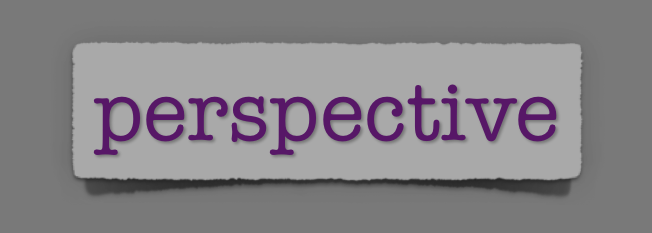It’s not hard to find pain around us.
I can name several friends who have marked the anniversary of a parent’s death, some who are facing difficult decisions about their jobs, others dealing with illnesses and uncertain outcomes. That just skims the surface. Pain is common currency, along with disappointment and loss. One of life’s lessons, I suppose, is that pain is woven into the fabric of our existence and is not something other than life.
That’s enough to take in on its own terms. Then I came across these words from Stephen Dunn in The Poet’s Notebook:
What does it mean if you know that a particular disappointment or sadness in your life cannot, relatively speaking, compete for emotional attention with a normal day for a normal person in the Sudan, in Bosnia? Do you write the poem of disappointment differently?
Perspective:
- a particular attitude toward or way of regarding something; a point of view;
- a true understanding of the relative importance of things; a sense of proportion;
- the art of drawing solid objects on a two-dimensional surface so as to give the right impression of their height, width, depth, and position in relation to each other when viewed from a particular point.
A sense of proportion. I miss my father—and my grief is real, even as I don’t know how it feels for a son whose father has been imprisoned at Guantanamo for who knows how many years without being charged or tried. We hear gunshots in our neighborhood sometimes at night and I never worry about a car bomb going off at the Durham Farmer’s Market on Saturday morning. We feel inconvenienced in going to the grocery store and women in Africa walk miles and miles to get water everyday. The contrast is as obvious as it is tragic, and there is more to perspective than simply ending this paragraph with #firstworldproblems, which is why I like Dunn’s question:
Do you write the poem of disappointment differently?
I heard a speaker, who was working hard to help the audience understand the magnitude of world hunger, paint a picture this way: instead of giving a big number he said, “Imagine a 747 packed full of children crashing every ten minutes all day everyday; that’s how many children die of hunger in our world.” The image was graphic, even evocative, but I didn’t know what to do with it except feel horrified and helpless. I couldn’t get “the right impression of their height, width, depth, and position in relation” to them, if you will. I didn’t know what to do with the distance between those kids and me, between understanding and change.
I look back at the definitions in the earlier paragraph and I see the word can go two directions: a point of view or a sense of proportion. The two are not necessarily synonymous. If my point of view is self-serving, I stand little chance of a “true understanding of the relative importance of things.” I can’t find my place in this world if I am convinced I am the center of it. I won’t be able to grasp what a normal day feels like for a normal person in Iran or Afghanistan, or even across town, if I look with eyes colored by fear.
And—not but—my grief an my disappointment are real. I don’t think Dunn’s question is rhetorical. The pain any of us feel is not measured by competition, as I am reminded by an old favorite, Mary Oliver’s “Wild Geese.”
You do not have to be good.
You do not have to walk on your knees
For a hundred miles through the desert, repenting. You only have to let the soft animal of your body
love what it loves.
Tell me about your despair, yours, and I will tell you mine.
Meanwhile the world goes on.
Meanwhile the sun and the clear pebbles of the rain
are moving across the landscapes,
over the prairies and the deep trees,
the mountains and the rivers.
Meanwhile the wild geese, high in the clean blue air,
are heading home again.
Whoever you are, no matter how lonely,
the world offers itself to your imagination,
calls to you like the wild geese, harsh and exciting —
over and over announcing your place
in the family of things.
Here’s why we write the poem differently: those dying in the streets of Baghdad are family, as are those planting the bombs. We are connected, related, with all the complications and hope that come with those ties. Grief in any language fluently spoken here.
Meanwhile the world goes on.
Peace,
Milton







Yeah.
A few minutes ago I was ranting to Janice in the car about how those 747s will be crashing more and more frequently if folks, both here at home (which triggered the rant) and those around the world, don’t wake up to the growing populatioin crisis we have brought on ourselves. Oliver’s poem has long been a favorite of mine. Reading it again has helped me take a longer and more hpopeful veiw. Thanks for reminding me.